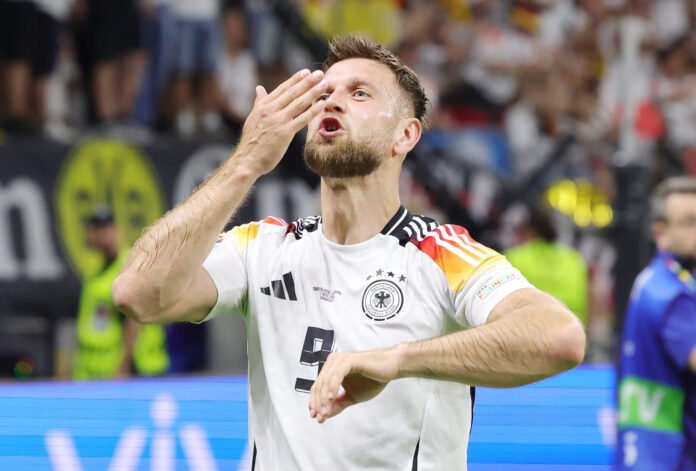At the end of a long night in Frankfurt, after a fight with Switzerland and a slippery pitch, Germany found their hero.
Niclas Fullkrug is not from the bloodline of great German forwards of the past. He is no Jurgen Klinsmann or Miroslav Klose. Nor has Fullkrug, 31, ever been that fashionable. He has spent his career bouncing between the Bundesliga and the division below, and his place in Julian Nagelsmann’s squad is a commentary on the country’s shortage of No.9s.
Enough of what Fullkrug is not. What he is, is a bull of a centre-forward with an uncomplicated instinct. Since earning promotion with Werder Bremen in 2022 and then joining Borussia Dortmund a year later, for €13million, he has grown cannier, more dependable and better at defeating the presuming limits of his talent.
And thank goodness Germany have him. On Sunday night he scored his 13th goal for his country and his seventh as a substitute. No European player currently has more goals from the bench in major competitions than Fullkrug does.
On Sunday his 13th — and most important — goal rescued Germany a 1-1 draw against Switzerland on a night when their brightest lights had failed to shine. Jamal Musiala was prominent early before fading. Florian Wirtz struggled for influence before being substituted. Toni Kroos’ legendary precision was askew. At the back, Jonathan Tah and Antonio Rudiger endured a wretched night. The former was booked and substituted. He will now miss the next round. The latter suffered a lower leg injury which makes him a doubt that next game, too.
It was the irony of the occasion. Fullkrug is popular with supporters because he has a habit of scoring goals for the national team. That will always win friends. But he is humble and likeable, with a gap-toothed smile and an unaffected appreciation for the privilege of being a professional footballer.
He is plainspoken and honest. He only became a German international in 2022, when he was 29, and has acquired few of the pretensions of a professional athlete in the years since. Remarkably, he averages a goal every 57 minutes for Germany. Equally notable is the ease with which he shrugs those accolades away and remains what fans and writers tend to describe as “normal”.
“I’m just used to being a substitute,” he said after the game, waving away any notion of a special impact on games.
“When I was a bit younger and didn’t have always get to start for my clubs, it worked quite well. It’s always important to prepare as if you were going to play.”
It is not a routine; this is just who Fullkrug is. But his goal against Switzerland was technically perfect. He muscled his way through a defence that had thwarted Germany all evening, thudding David Raum’s cross into the top corner. In the aftermath, Fullkrug seemed more at ease describing the technical virtues of Raum’s delivery.
Fullkrug’s goal was his 13th for Germany (Lars Baron/Getty Images)
“David is a master crosser,” Fullkrug said.
“That he took another touch before delivering the cross that was also crucial, because it forced the defence to drop deeper. That makes the cross ideal and then I just had to take a little speed out of the ball. And we know that I’m good at heading.”
That is quite the undersell.
But there can be no understating the moment’s importance. Had Germany lost to Switzerland, it might have cost them more than just first place in their group. All the way through this tournament, momentum has been building and the German public has been growing more excited.
Fullkrug’s goal maintained that. It bore comparison to one from nearly two decades ago.
Germany has been looking for parallels with the 2006 World Cup all the way through this tournament. It wants to find the route back to those Halcyon days.
After the game, Nagelsmann was asked whether Fullkrug’s equaliser, scored in 92nd minute, was this year’s version of a goal Oliver Neuville scored against Poland. It was a good question. Neuville turned a lifeless 0-0 draw, played in a sterile environment, into a dramatic 1-0 win that enraptured a nation.
Parallels? Certainly. Nagelsmann said that he had not been thinking about that in the immediate aftermath. It had noted the quiet atmosphere and the creeping anxiety, though, and felt that — beyond its literal importance — the goal had produced a “special explosion” of energy. He was right: the crowd in Frankfurt burst with joy. Whatever was captured in the first few games of this tournament, whatever heart and minds Germany were able to win, that goal kept them in hand.
It kept Nagelsmann’s team unbeaten and, slowly, believing in themselves more and more.
“There’s a very special spirit in the team,” Nagelsmann said, “and that can create a lot.”
Germany are not a perfect team and Sunday night provided a reminder of that. But positive energy and togetherness are powerful energies in sport and thanks to Fullkrug, that unlikely hero who keeps on mattering and making the difference, Nagelsmann and his players still have those precious intangibles.
(Top photo: Fullkrug celebrates his late equaliser. Ralf Ibing – firo sportphoto/Getty Images)
Read the full article here


